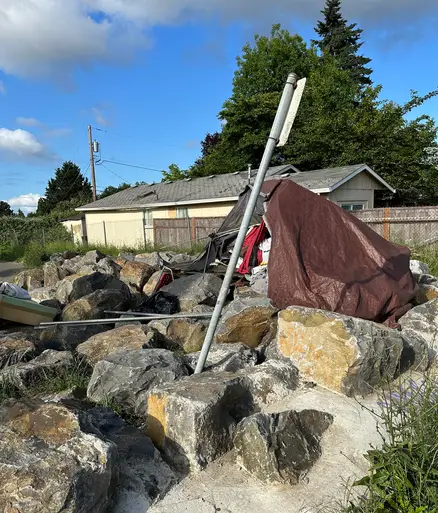4 Reasons Why You Should Consider NOT Relocating To Portland
October 14, 2023
No Comments

As we all know, the grass can be greener on the other side. If you’re looking at moving to Portland from another city in a different state, then there may be a plethora of reasons that you want to leave. However, not all that glitters is gold – and Portland certainly has some problems of its own that you may not have considered.
Here are some reasons you may not have thought about that make Portland a bad place to live:
Cost of Living
- Housing Prices: Portland has experienced a significant rise in housing prices over the past few years, making it increasingly expensive to buy a home in the area. Rental prices have also seen a notable increase. While salaries have increased at the same time, they are still outpaced by property. Overall, the cost of living in Portland is a staggering 24% higher than the national average.
- Utilities and Services: In addition to housing, utilities, and various services (like internet, garbage collection, etc.) are more expensive compared to other U.S. cities.
- Taxes: Oregon has no sales tax, which can be a benefit, but the state does impose a relatively high income tax. This financial burden can be a consideration for people with varying income levels thinking of moving to Portland. For example, if you had a similar paying job in a Texan city, you would find your take-home pay being considerably less.
- General Expenses: Day-to-day expenses, like grocery shopping, dining out, and entertainment, can be higher in Portland compared to other locations, contributing to an overall elevated cost of living.
Weather
- Rainy Days: Portland is renowned for its frequent rain, receiving precipitation on an average of 154 days per year. The city does not necessarily receive extremely heavy rainfall but tends to have a consistent drizzle or light rain, contributing to wet conditions.
- Gray Skies: Along with the rain, Portland tends to have a lot of overcast days, which might affect the mood and activities of individuals who prefer clear, sunny skies.
- Winter Weather: Winters can be dark and damp with temperatures often hovering around the 30-40 degree Fahrenheit mark. Snowfall is not uncommon, but substantial accumulation in the city itself is rare. When it does occur, it can disrupt transit and services due to the city’s limited snow removal capabilities.
- Summer Drought: Conversely, summers in Portland are often quite dry, sometimes resulting in drought conditions. While summers are typically mild and pleasant, the area has experienced hotter and dryer conditions in recent years, potentially impacting activities and contributing to wildfire risk in surrounding areas.
Homelessness
- Visible Issue: Homelessness is a visible and pervasive issue in Portland. Encampments and individuals experiencing homelessness can be seen in various parts of the city, including downtown areas and neighborhood streets.
- Safety and Health Concerns: Some residents express concerns related to safety, health, and sanitation in areas with substantial homeless populations. Needles and other sharp objects on the floor are a problem within the urban environment of Portland, but in suburban parks and semi-woodland environments, this can be even more dangerous for children and pets.
- Impact on Community: The issue of homelessness can impact the community in varied ways, from affecting local businesses to influencing the overall atmosphere and usability of public spaces. While there are initiatives and programs aimed at addressing the issue, it remains a prominent concern for many residing in the city.
- Policy and Management: Different stakeholders, including residents, business owners, and policymakers, often have varied perspectives and proposed solutions regarding managing homelessness in the city, sometimes leading to disagreements or tension regarding how to effectively address and mitigate related challenges.

Safety and Crime
- Protests and Civil Unrest: Over the past few years, Portland has gained national attention due to numerous protests and instances of civil unrest. While many demonstrations are peaceful, some have escalated into violence and vandalism, impacting residents and businesses. These incidents have sparked discussions and varied opinions on law enforcement, public safety, and the management of protests in the city.
- Property Crime: Portland has experienced challenges with property crime, such as burglaries, theft, and car prowls. Some neighborhoods have reported issues with break-ins and thefts from vehicles. Residents often express concern about the prevalence and management of property crime in the city.
- Violent Crime: While the violent crime rate in Portland is lower than in some other major U.S. cities, it still exists and can be a concern depending on the neighborhood. There have been instances of shootings and other violent acts that contribute to safety concerns among residents.
- Policing and Law Enforcement: The subject of policing in Portland is often a topic of discussion and, at times, contention. Diverse views on law enforcement tactics, police funding, and community safety strategies create varied perspectives on how crime should be addressed and prevented in the city.
- Safety Perceptions: Perceptions of safety can vary significantly among residents, often depending on their location, experiences, and demographics. Some may feel secure in their neighborhoods, while others, particularly in areas with higher crime rates, might express concern and dissatisfaction.
- Community and Neighborhood Impact: Crime and safety issues not only impact individuals but also have a broader effect on communities and neighborhoods. They can influence property values, business operations, and the overall quality of life for those residing in affected areas.
- Public Policies and Initiatives: How the city approaches safety and crime is also pivotal. Policies, initiatives, and community programs aiming at reducing crime and enhancing safety are crucial in addressing these issues. Portland is not tough on crime compared to red cities, so if you want something similar to that, Portland is likely not for you.
